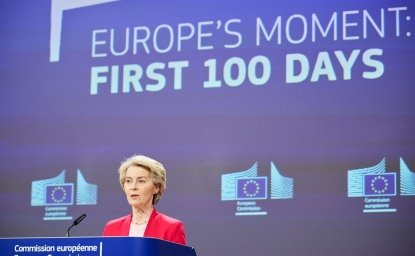309. A Neoliberal Trojan Horse? The New EU Member States and EU Social Model

Darina Malova is Professor of Political Science at the Comenius University in Bratislava. She spoke at an EES noon discussion on December 1, 2004 while she was the Russian-Eurasian Scholar in Residence at the Political Science Department of Colorodo College. The following is a summary of her presentation. Meeting Report 309.
European Union (EU) enlargement raises important questions about both the impact of EU membership on the postcommunist countries of Central and Eastern Europe and the impact of these new member states on the EU. Although it has been a relatively short time since the May 1, 2004 enlargement, several trends can already be identified. The first trend reveals that the EU and its institutions have lost much of the influence they had in the new member states during the accession process. New member states now have somewhat more freedom in directing their economic, social and political development. A second trend indicates that some new member states (namely those that are poorer, more peripheral and "newer" nation states) have displayed a stronger preference for the Anglo-American model of social policy and opposed the traditional European social model, based on social cohesion and solidarity. The third trend is connected to the so-called "fiscal dumping" practiced by several of the new member states, where substantially lower levels of corporate and payroll taxes (compared to the average tax and payroll burden in the EU-15) were introduced. Several of the EU-15 states immediately expressed their disapproval. This unanticipated competition between the old and new member states goes hand in hand with "social dumping," which stems from the wage differentials between the old and new member states. As a result, governments in the EU-15 are afraid that prosperous companies in the West will move to Eastern Europe. These trends indicate an overall divergence between old and new EU member states. But, is it a serious gap or just a temporary digression? What are the underlying reasons for the divergent processes in the two parts of Europe and what are the possible consequences for the EU?
To better understand the policy goals of some of the new member states, it is necessary to acknowledge the difference between the status of an EU accession country and that of an EU member state. Although the new member states that joined the EU in May 2004 remain outside both the euro zone and Schengen, the transition from accession state to member state status has had significant implications.
For accession countries, their relationship with the EU can largely be characterized as a one-way transfer of EU rules and norms. During the accession process, the EU was able to shape domestic policy of accession countries through the carrots and sticks of conditionality. While the European Commission set the political, economic and administrative conditions and evaluated their implementation, the accession countries tried hard to simply adapt to the requirements. At times, countries such as Latvia, Lithuania or Slovakia resembled obedient dogs, faithfully following their master's instructions. Because the Copenhagen Criteria did not allow new accession countries to opt-out of certain policies (as was done by certain member states in the past), when faced with sensitive policy areas, postcommunist governments tended to request transition periods for their implementation. This meant that the implementation of several institutional, administrative, economic and social requirements was delayed by a few years until after entry into the EU. In this way many of the postcommunist EU member states delayed the implementation of some costly or unpopular measures, such as environmental protection standards, open market access to agricultural and forest land and standards on excise duties or value added tax rates on selected goods and services.
The shift from the status of an accession country to a member state provided each new EU member with extra room to maneuver, since it was no longer a mere object of EU decisions, but rather an equal partner in setting those standards. While constrained during accession, membership allows states to pursue policies outside the European mainstream in policy areas that are not harmonized by EU law. In Slovakia, these policies focused on direct taxation and the reduction of social safety-net programs. These policies seemed to invoke the ire of France, Germany and Sweden, while Italian Prime Minister Silvio Berlusconi complimented Slovakia's centre-right government for having pushed through the kinds of reforms, of which his own government "could only dream." The fact that Slovakia's policies were so controversial confirms the tenuous nature of the European Union.
Moreover, West European leaders critical of Slovak policies seem to have forgotten that during the accession process the EU dictated to Slovakia an economic plan for its transition to a market economy. That neo-liberal agenda has led to a desirable outcome in many postcommunist countries. Its success led East Europeans to embrace the ideology. Even before EU membership, some East European governments went further in privatization and deregulating banking, telecoms, transport and energy than some of the existing member states. For example, Estonia—the ‘champion' of market reforms—had to revoke some of its laws because they went too far in deregulating and liberalizing the market and contradicted EU standards. Apparently, some of these disciplined pupils fulfilled the Copenhagen criteria with too much enthusiasm and did their homework too well.
Despite the successful transition to a market economy, the new member states are distinctly poorer than the EU 15, and it is therefore difficult for them to compete with the more developed economies in the single market. In an attempt to achieve high and long-term economic growth the postcommunist countries are engaged in a so-called "race-to-the-bottom" competition over foreign direct investments. As a result, the governments in some of the new member states substantially lowered their corporate and payroll taxes. While the low corporate taxes in the Baltic States did not provoke negative reactions in the Western part of the EU, the decision of the Slovak government to introduce a 19 percent flat rate tax provoked criticism in some of the more established EU member states and led to a domino effect in neighboring countries, as not only Poland and Hungary, but also Austria lowered their corporate taxes. French Finance Minister Nicolas Sarkozy accused the new member states of unfair fiscal dumping and outsourcing, which suck jobs from the West. He suggested that countries with low taxes should not be entitled to receive EU developmental aid, because they cannot claim to be rich enough to do away with taxes, while also claiming to be poor enough to ask for additional funds. In the end governments in Paris, Berlin and Stockholm called for tax harmonization across the Union. The neo-liberal agenda of the new member states has, therefore, provoked demands for further integration from the more established member states—which was precisely what the newcomers do not want.
Governments in new member states—for example in Hungary, Poland, Estonia, Lithuania and Latvia—have continued to liberalize and privatize not only their economies, but also their social policies. For example, the three Baltic States have shifted their pension policies from a publicly-financed system to one based on the World Bank model, according to which private funding, fiscal sustainability, savings, economic growth and individual accounts are highlighted. Slovakia joined this type of reform and introduced a system with the highest percentage (9 percent) of annual salary to be directed to private pension investment accounts. The architects of these pension reforms were silent on income adequacy, solidarity and cohesion—which are the traditional pillars of social policy in Europe. West European leaders did not criticize this reform, in part because pension systems fall under the full competence of national governments, but also due to the fact that most governments in the EU-15 themselves are facing the challenge of restructuring social welfare policies. Moreover, the scope of EU-acceptable policies is wide-ranging, since it includes British liberalism as well as the German social-market economy and Swedish socialism. The important variations between the EU member states can be seen in the ways in which social reforms have been implemented in some of the new members states, such as the Baltic States and Slovakia. Even in the Czech Republic, Hungary and Poland, the governments must be more cautious about provoking social unrest while implementing unpopular measures. Whenever similar neo-liberal reforms have been suggested in the EU-15, trade unions have taken center stage in mobilizing opposition. Such popular protests forced the Italian, French and German governments to negotiate with trade unions and make substantial concessions at the expense of implementing real social reforms.
How can the different political and social responses to the neo-liberal reforms across the European Union be explained? Decisions in the new member states to reform tax policy, pensions, social security benefits, health care and education are no longer directly imposed by EU conditionality, but they represent free and voluntary policy choices of national political actors. The continuation of the neo-liberal policy agenda may represent a "spillover effect" of the conditionality imposed on the postcommunist countries, not only by the EU, but also by the International Monetary Fund, the World Bank and the Organization for Economic Cooperation and Development. Governments in Central and Eastern Europe—regardless of whether they are left-wing, center or right-wing—therefore perceive neo-liberal reforms as part and parcel of postcommunist economic reconstruction and are truly committed to such reforms. Though new member states apparently lack many resources that are available to the EU-15, they are not afraid of experimenting with further liberalization and market restructuring. This fearless attitude can be better understood in the context of postcommunist transition and adaptation to extremely rapid economic and social changes, implemented since the collapse of communism.
An illustrative example is offered by the Lisbon process, a liberal economic reform strategy that included welfare restructuring, which was adopted by the EU Council in 2000. The strategy has raised issues that have long been extremely contentious among the EU member states, since it zeros in on the differences in values among the member states regarding the national preferences in the balance between social protection and market liberalism. The key aim of the Lisbon Strategy is to make the EU the most competitive and dynamic knowledge-based economy in the world.
Although not officially part of the acquis communautaire, the EU candidate countries were invited to the Lisbon Strategy meeting and voluntarily signed Joint Assessment Papers, which allowed the Commission to guide their labor market policy. The strategy for the new member states focused on job creation, helping small and medium size business, liberalizing markets for energy and telecoms, strengthening the education system, investing in research and development and supporting the broader use of information technology. However, such measures need huge investment of public funds before they can increase the productivity and competitiveness of the EU on the world market. And this is precisely what the new member states cannot do. Countries such as Slovakia, Estonia, Lithuania and Latvia, have been instructed that they must cut public spending if they want to join the Euro-zone, which limits the amount they can invest in education, research and development.
This did not prevent the Slovak finance minister, Ivan Miklos, from criticizing the rest of the EU for not implementing the Lisbon Strategy. He stated that the Strategy was not very successful because of the lack of political will to carry out structural reforms, and the fact that the strategy outlines too many goals, without regard to the specific strengths or weaknesses of a given country. He proudly added that Slovakia was the first EU member state to adopt a national Lisbon Strategy with its own priorities, which should be obligatory for all EU countries in the future. Althgouh his statement was aimed at a domestic audience, it may contribute to a European Commission decision to amend the vague Lisbon Strategy.
The Slovak case shows that leading figures behind reforms are strongly convinced of the merits of their case and of the superiority of their ideological stance. Governments in new member states try to sell neo-liberal policies as the only way to secure high and long-term economic growth, which will ultimately lead to the improvement of living standards, comparable with that of highly developed European countries. Also they argue that lowering corporate and payroll taxes was necessary to restructure economies in postcommunist Eastern Europe. The general political mood supports similar commitments to economic growth as the universal remedy for social problems.
The current victory of neo-liberalism in several new member states cannot be explained by external factors and elite commitments alone. The growing variation within the EU also depends on the complex dynamics of domestic politics. This includes weak and elite-driven political parties in the government, which are usually at the forefront of the neo-liberal agenda. Elite-driven parties tend to have weak mechanisms for accountability and they can be largely personality-based. This, in combination with the ideological conviction of leading politicians, means that governments can pursue a radical neo-liberal agenda that seems to stray far from the European standard. This has also been facilitated by the lack of effective political opposition. The public may be convinced of the need for reform, but there is no opposition to challenge the government on which policies are the most effective and which offer a humane path to achieving economic prosperity. What is striking is the failure to mobilize discontent brought on by growing income disparities in postcommunist Europe. This inability to galvanize discontent stems from a combination of a dearth of powerful social actors and the social conditions of the electorate. In all new member states, trade unions are extremely weak and unable to mobilize opposition to neo-liberal reforms. Weak civic participation can be partly explained by the economic hardships suffered by large sections of the population, which do not leave much time or energy for public activity.
Currently, the EU is in a tug-of-war between two social models. An optimist might predict that the neo-liberal experiment in the new member states will prove to be successful, leading to increased prosperity in the new member states. By consequence, the new member states would soon become less of a burden on the EU's budget and structural funds, and they might even be a source for inspiration for how to shape social and economic policy in the entire EU. New member states may therefore shift from being the object of Europeanization to a model for the rest of the EU. However, a pessimist would warn that neo-liberal policies in the new member states may increase regional disparities and bring about general poverty rather than general prosperity. In any case, there can be no doubt that the 2004 enlargement has not only transformed the countries that joined the EU, but has altered the dynamics within the EU as well.
Author

Global Europe Program
The Global Europe Program is focused on Europe’s capabilities, and how it engages on critical global issues. We investigate European approaches to critical global issues. We examine Europe’s relations with Russia and Eurasia, China and the Indo-Pacific, the Middle East and Africa. Our initiatives include “Ukraine in Europe”—an examination of what it will take to make Ukraine’s European future a reality. But we also examine the role of NATO, the European Union and the OSCE, Europe’s energy security, transatlantic trade disputes, and challenges to democracy. The Global Europe Program’s staff, scholars-in-residence, and Global Fellows participate in seminars, policy study groups, and international conferences to provide analytical recommendations to policy makers and the media. Read more

Explore More
Browse Insights & Analysis
The Growing Transatlantic “Big Tech” Rift Explained

The EU's Role in the Future of European Defense

